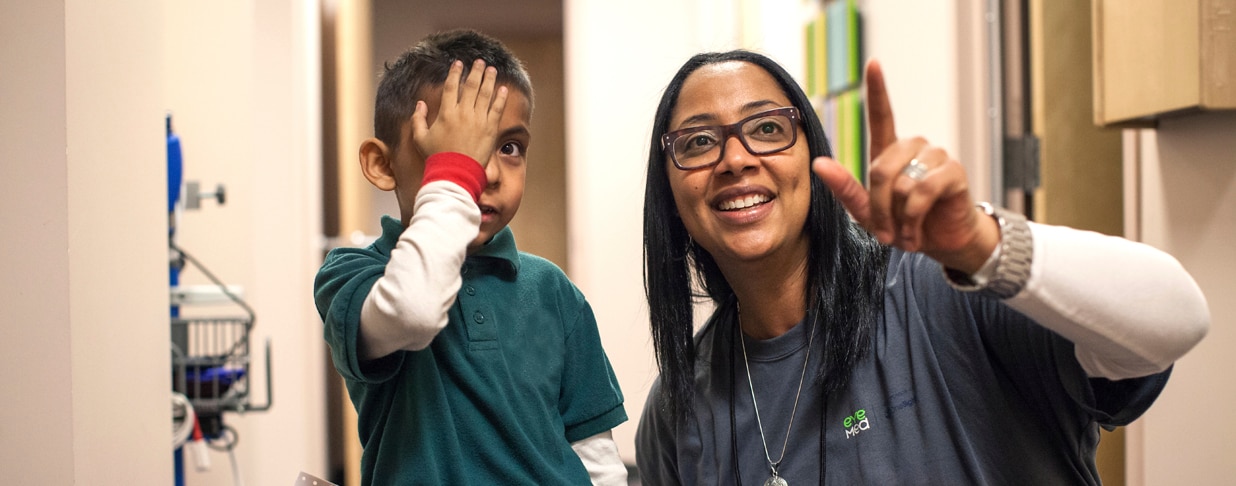How can we solve our global vision challenge?
Better vision can have a positive effect on our lives, our society and our economy. That’s why it’s important for vision companies to continuously improve access and awareness for everyone.
One thing we have in common is a need for quality vision care. Nearly 2.2 billion people currently have a vision-related issue, yet nearly half of those problems could have been prevented or haven’t been addressed.1
That number shows a disparity in sustainable access to care. And, unless we do something, it’s going to grow.
Looking ahead to 2050:2
- It’s estimated that half the world will be living with myopia, a condition where the person can see near objects clearly but far objects are blurry
- Blindness rates will be 50% higher
The challenges of global vision care
Poor vision can affect anyone at any age:1
- Children struggle in school, causing developmental issues.
- Adults have higher rates of depression and anxiety, lowering their employability.
- Older adults experience social isolation, increasing the need for nursing or specialized care.
The reasons people aren’t accessing vision care can be wide-ranging. In certain parts of the world, eye care is too expensive or too far away to justify the travel. For others who already have a vision impairment, seeking care or finding helpful information simply isn’t possible. And some people aren’t even aware they have a vision problem.
How can we bring vision care to all?
Independent nonprofits like OneSight are working tirelessly to make vision care accessible to those who need it. EyeMed is committed to helping people see life to the fullest, and we are a proud gold sponsor of OneSight. Together, we focus on improvements in three key areas:
Access – OneSight brings vision to people by setting up a charitable clinic that offers free eye exams and glasses. Nearly 2,000 clinics have been hosted in 53 countries so far, and more are on the way. OneSight serves communities throughout the United States, including indigenous and migrant communities.
Empowerment – OneSight sets communities up for success by helping open permanent vision centers to provide better access and education. These centers are staffed by employees hired locally and offer educational opportunities by promoting training and programs at local colleges. These centers provide a full range of vision care that can remain sustainable. So far, there have been 197 centers opened worldwide.
Education and awareness – OneSight spreads the word about vision health by helping people understand:
- Why eye exams are important
- Overall vision health
- How to care for their vision
- How vision care can improve their health care
- Signs of possible vision issues
- Where to find treatment
The future of vision care
It’s our responsibility as global citizens to keep the vision crisis from getting worse. OneSight is showing everyone that it can be done. As of July 2021, the United Nations General Assembly has taken note by passing a “Vision for Everyone” Resolution, with a commitment to provide vision care for 1.1 billion people living with preventable sight loss by 2030.3
We provide vision care that can create better opportunities, empowerment and equality for everyone.
Learn more
We’re passionate about our partnership with OneSight. Together, EyeMed is proud to bring onsite vision care services, including vision care exams and new prescription eyewear, to people who lack access across the U.S. and around the globe. Our clients and strategic partners have taken an active role in supporting OneSight’s efforts. See how you can get involved in OneSight’s Donate for Good initiative.
To learn more about sustainable access, download our whitepaper below:
Whitepaper for Employers and Brokers
Whitepaper for Health and Ancillary Partners
••••
1 – World Health Organization, “Blindness and Vision Impairment,” October 2021.
2 -- The Lancet, “The Lancet Global Health Commission on Global Eye Health: vision beyond 2020,” February 2021.
3 – United Nations General Assembly, “Eradication of poverty and other development issues,” July 2021.




